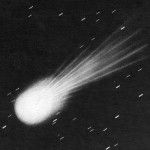A ‘Cóiméad’ by Any Other Name Posted by róislín on Feb 22, 2013 in Irish Language
Last blog I alluded to five words in Irish for comet agus seo iad.
The first one you have no doubt spotted by now since it’s i dteideal an bhlag seo. It’s a fairly straightforward word, first declension, masculine. Here are its forms:
1) cóiméad, comet, as in “Beidh Cóiméad Halley ar ais sa bhliain 2061 nó thart fá sin.”
2) an cóiméad, the comet [un KOH-myayd, the “-my” sound indicating a “slender” pronunciation of “m,” like the “m” in English “muse” or “mewl;” since this is a transcript, remember that the “my” shouldn’t be read as English “my” per se]
3) cóiméid, of a comet [KOH-myaydj, note the change to the ending, now “slender”], as in “eireaball cóiméid,” a tail of a comet
4) an chóiméid, of the comet [un KHOH-myaydj, with the “kh” like the “ch” of “chutzpah”], as in “eireaball an chóiméid,” the tail of the comet
4) cóiméid, comets (yes, it looks and sounds just like the form that means “of a comet” — typical first-declension stuff), as in “cóiméid ghearrthréimhseacha,” short-period comets [KOH-myaydj YAR-HRAYV-shukh-huh, note that the “g” and the “t” are silent and the “mh” is like “v”]
5) na cóiméid, the comets
6) cóiméad, of comets, as in “fithisí cóiméad” (orbits of comets). Note that we have to determine through context and/or word order whether “cóiméad” means “comet” as the subject/object of a sentence or whether it means “of comets”. Yes, it’s a bit of an extra challenge but English does the same thing at times. Consider, for example, the phrase “we read.” When we see the phrase, we need context (words like “every day” or “yesterday” to determine whether the action is in the present or past tense.
7) na gcóiméad, of the comets, as in “eireabaill na gcóiméad” (the tails of the comets)
We might also encounter the following forms:
ar an gcóiméad, on the comet [… GOH-myayd]
ar an chóiméad, on the comet, same meaning, different (Northern) dialect [… KHOH-myayd]
ar chóiméad, on a comet
ar chóiméid, on comets
Now all of that is just for the word “cóiméad,” but there are more words for “comet.” Admittedly, these are the folksier words and aren’t used much in the scientific descriptions. They’re all based on the word “réalta” (star).
a) réalta eireabaill, or réalta an eireabaill, lit. “star of tail,” or “the star of the tail”
b) réalta scuaibe, or réalta na scuaibe, lit. “star of broom/brush” or “the star of the broom/brush”
c) réalta mhongach, or mongréalta, lit. maned or long-haired star. This one shows up in the very modern term “tóraí mongréalta” (comet chaser) (http://www.djei.ie/publications/corporate/2004/annualreport.ga.pdf) but it can also be found in 16th-century Irish literature, and perhaps earlier.
d) and a bit surprisingly, and admittedly on the obscure (sort of archaic) side, but intriguing nonetheless, bodréalta (presumably the implication here is a “star with a tail,” once again, but that’s not exactly, ermm, what it says. I’d recommend being very circumspect about using this. In fact for most purposes, I’d just go ahead with “cóiméad,” unless your intention is to wax poetic.
So there we have it, five basic words for comet, ranging from scientific to poetic, agus smearadh leath-thagartha ann lena chois sin.
Perhaps we’ll revisit the topic in 2061 nuair a thagann Cóiméad Halley ar ais (má tá an blag ann fós), or perhaps before then. Hmm, I suppose I should check out some recent comet sightings, or anticipated ones. Nótaí tráchta ó dhuine ar bith? Nó tagairtí? Nó leath-thagairtí? SGF, Róislín
Gluaisín: leath-thagairt [LYA-HAG-irtch], innuendo, lit. “half-reference,” the genitive case is “leath-thagartha” (of innuendo); lena chois sin, for good measure

Build vocabulary, practice pronunciation, and more with Transparent Language Online. Available anytime, anywhere, on any device.





Comments:
Mise Áine:
Tá ‘dreige’ agus ‘caor thein(eadh’)i bhfoclóir béarla agus Gaedhilge L. McCionnaith don ‘meteor’. Caor thine in WinGléacht.
Maidir le ‘comet,’ i McCionnaith, tá
‘réiltín an earbaill’;
réalt an rubaill, an driubaill’;
‘réalt mongach,earbaill’;
‘réalta na scuaibe’.
Tá ‘órchumarg’ agus ‘dreag’ i bhfoclóir Lane’s Larger do ‘meteor’;
le ‘órchumargach’ ann do ‘meteoric’;
le ‘bodréalt’, ‘mongréalt’, ‘réalt na sguaibe’, agus ‘réalt an earbaill’ ann do ‘comet.’
Blagmhír shuimiúil uait, mar is iondúil, a Róislín..:-)
róislín:
@Mise Áine Eolas iontach mar is gnách! Go raibh maith agat as scríobh isteach!